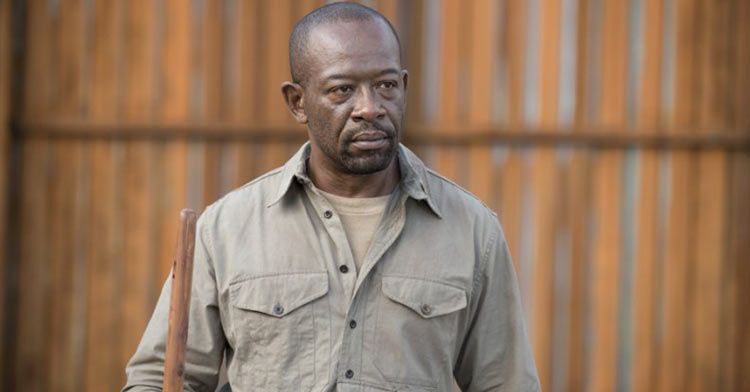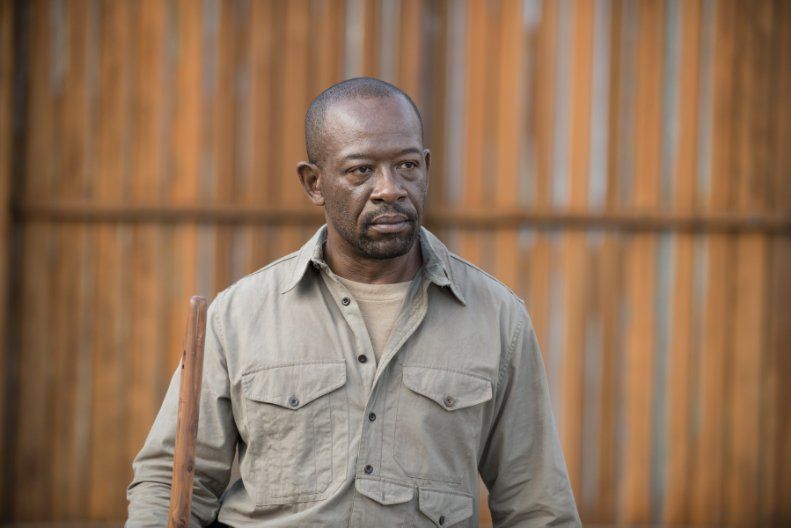Last week, I mentioned how "The Walking Dead's" sixth season premiere hinted at an inevitable conflict between the increasingly ruthless Rick and the more pacifistic Morgan. That might still happen, as we're only two chapters deep, but the flaws in Morgan's logic are already starting to show in the second episode. Yet the tension doesn't get expanded upon between him and Rick -- who's still trying to round up the errant walker herd with the rest of the main cast -- but Carol. The "To kill or not to kill?" argument is one we've heard countless times on the show before (as recently as last season with Tyreese, in fact), and yet it doesn't feel stale here, as the debate gets fought with actions rather than words. When the Wolves invade the domestic bliss of Alexandria, there's little time for conversation.
That's especially true when the attack comes so abruptly. Even though we all knew knew something was going to happen, given the blaring truck horn that ended "First Time Again," writer Jennifer Lynch sets up "JSS" as being a relatively low-key episode. After a stark cold open that summarizes the death of Enid's parents and her grueling journey to Alexandria (raw tortoise, anyone?), we're treated to the suburban pleasures of the neighborhood as Carol chats with Mrs. Neudermyer and playfully chastises her for smoking. For a few easygoing minutes, it seems that the most conflict we're going to get is Ron refusing a haircut from his mother because she's still friends with Rick. Then, out of nowhere, Mrs. Neudermyer gets a machete to the stomach and the Wolves are at Alexandria's door, taking advantage of how ill-equipped most of the residents are for an attack, especially since most of the town's skilled combatants are off with Rick. When Carol and Morgan realize Deanna is of more help to them hiding than fighting, and Spencer can't even bring himself to kill the walker who's pressed up against the truck horn (he shot at the Wolves' vehicle when he saw it hurling at the front gate), they know that the safety of the community falls largely on their shoulders.
As we see them tactically pick off their enemies, there's something to be said for both of their stances on the whole killing thing. On one hand, Carol (disguised as a Wolf) putting a bullet in the heads of two invaders allows her to promptly secure the armory before any outsiders can get their hands on the town's guns. And you could argue that Morgan's refusal to kill the first group of Wolves he encountered was part of what led them to Alexandria in the first place. That, and their discovery of Aaron's photos.
But patience and compassion have their merits, too. These traits give Morgan the good sense to rescue Gabriel instead of just passing him by, as Carol suggests. I'm sure many viewers have come to despise the cowardly priest and would have loved to see him hacked apart, but he expresses genuine remorse and a desire to be braver earlier on to Carl, plus I have a feeling he still has a significant, hopefully beneficial part to play in the greater scheme of things. Morgan knows that everyone deserves redemption, even him. Also, Carol's trigger-happiness bites them all in the ass when she shoots a Wolf that Morgan and Gabriel manage to tie up, right as he was about to reveal information on traps and perhaps other useful knowledge from the enemy camp.
By the end of the battle, it appears that Morgan breaks his no-kill rule when the very first Wolf he ran into back in last season's "Conquer" corners him and he doesn't see another way out. Granted, whether or not he bludgeons the man to actual death is somewhat ambiguous since we don't see a corpse or even the full assault. But considering that he apologizes to his foe right before bringing down his staff and the final shot of the episode is Morgan walking down the bloodied streets of Alexandria alone, I think it's safe to say he's come around to Carol's (and Rick's) philosophy.
Or maybe he hasn't. The show so often paints the post-zombie-apocalyptic world in such black and white terms, and I'm wondering if a grayer middle ground can be reached. If you're too afraid to dole out death, then yeah, you end up dangerously craven like Gabriel, Deanna or any number of Alexandria's citizens. Conversely, being too quick to plunge the blade or pull the trigger can take a considerable toll on your humanity, as it seems to be doing to Rick. At what point does coldness turn you into one of the hunters from Terminus? What happens when physical survival becomes your number-one priority, regardless of what it means to the rest of your soul? What's it like to be nothing more than a shell of detached logic and violence?
Perhaps the ideal code lies somewhere between the two outlooks, and perhaps Morgan will be able to achieve it: the decision to kill when you have to, but only after considering all other options first. Someone else who could embody that sense of practical yet empathetic survivalism is Jessie. Unlike so many of her fellow Alexandrians, she's able to muster up the required bloodlust when the chips are down, killing a Wolf with scissors when she breaks into her house and threatens her children. The fact that she wasn't able to to defend them from another monster -- their own father -- probably gave her all the more reason to repeatedly jam the shears into the woman's neck.
All of these characters' various actions tie back to the episode's title, "JSS," the three letters that Enid has adopted as a sort of mantra in the bleak reign of the walkers. As we discover through a note she leaves for Carl after fleeing Alexandria, it stands for "Just Survive Somehow." And that means different things to different people. For Rick and Carol, it means not hesitating to kill when you feel threatened in the slightest. For Morgan, it means the opposite. For him, warmth and mercy are how one survives. Because if you lose those two things, are you really surviving at all?
Ironically, we're left not knowing what "Just Survive Somehow" means for Enid (beyond chowing down on reptile meat), even though she's the one that introduces those words to the audience. Is survival simply a matter of running away when things get too dangerous? Or is it something more sinister like banding with the Wolves? I don't completely buy that second theory, but as one of the baddies says to Morgan earlier on, you don't always have a choice in that sort of situation. Like I said, that's not exactly new territory for the show, but if it leads to more episodes that explore heavy questions through action sequences instead of ponderous dialogue, I'm all for it.


